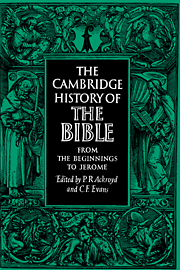Book contents
- Frontmatter
- I LANGUAGE AND SCRIPT
- II BOOKS IN THE ANCIENT WORLD
- III THE OLD TESTAMENT
- IV THE NEW TESTAMENT
- V THE BIBLE IN THE EARLY CHURCH
- 13 BIBLICAL EXEGESIS IN THE EARLY CHURCH
- 14 ORIGEN AS BIBLICAL SCHOLAR
- 15 THEODORE OF MOPSUESTIA AS REPRESENTATIVE OF THE ANTIOCHENE SCHOOL
- 16 JEROME AS BIBLICAL SCHOLAR
- 17 AUGUSTINE AS BIBLICAL SCHOLAR
- 18 THE PLACE OF THE BIBLE IN THE LITURGY
- Bibliography
- Abbreviations
- Notes on the Plates
- Indexes
- Plate Section">
- References
14 - ORIGEN AS BIBLICAL SCHOLAR
from V - THE BIBLE IN THE EARLY CHURCH
Published online by Cambridge University Press: 28 March 2008
- Frontmatter
- I LANGUAGE AND SCRIPT
- II BOOKS IN THE ANCIENT WORLD
- III THE OLD TESTAMENT
- IV THE NEW TESTAMENT
- V THE BIBLE IN THE EARLY CHURCH
- 13 BIBLICAL EXEGESIS IN THE EARLY CHURCH
- 14 ORIGEN AS BIBLICAL SCHOLAR
- 15 THEODORE OF MOPSUESTIA AS REPRESENTATIVE OF THE ANTIOCHENE SCHOOL
- 16 JEROME AS BIBLICAL SCHOLAR
- 17 AUGUSTINE AS BIBLICAL SCHOLAR
- 18 THE PLACE OF THE BIBLE IN THE LITURGY
- Bibliography
- Abbreviations
- Notes on the Plates
- Indexes
- Plate Section">
- References
Summary
There was never a time when the Church was without written scriptures. From the beginning she had the Old Testament and it was for her the oracles of God. With it went also the message of Jesus, the preached gospel of the salvation which he had achieved, and the orally transmitted accounts of his life and teaching. By the end of the first century the bulk of our New Testament documents had been written. By the end of the second century there was general agreement about the writings which were to be received as making up the scriptures of the New Testament. There was no agreed list and different churches varied in detail over which books should be acknowledged; but the differences were marginal and unimportant in comparison with the fundamental measure of agreement. By the year 200 there was in practice a Christian Bible.
Origen's career spans the first half of the third century. In the year 203, at the youthful age of 17, he took charge of the catechetical school of Alexandria. He died, possibly as the result of torture received in persecution, about 254. He was the most versatile of all the scholars of the early Church; he was apologist and preacher, biblical commentator and philosophical theologian. In all these tasks his primary tool was the Bible. The Bible was there ready to his hand, but its boundaries were still ill-defined and its interpretation in dispute. Origen was forced to grapple more deeply than any of his predecessors with the questions, What constitutes the Bible? and How is it to be understood?
- Type
- Chapter
- Information
- The Cambridge History of the Bible , pp. 454 - 489Publisher: Cambridge University PressPrint publication year: 1970
References
- 4
- Cited by



